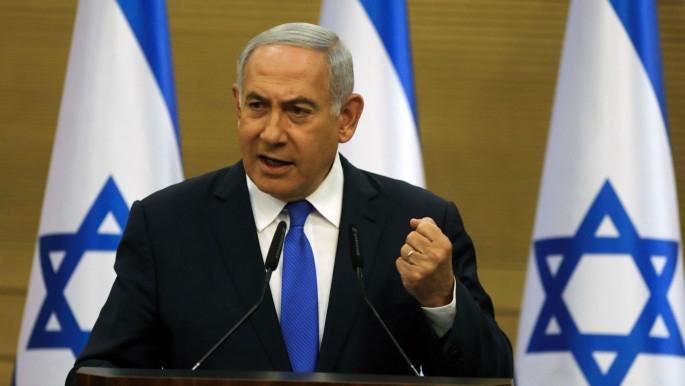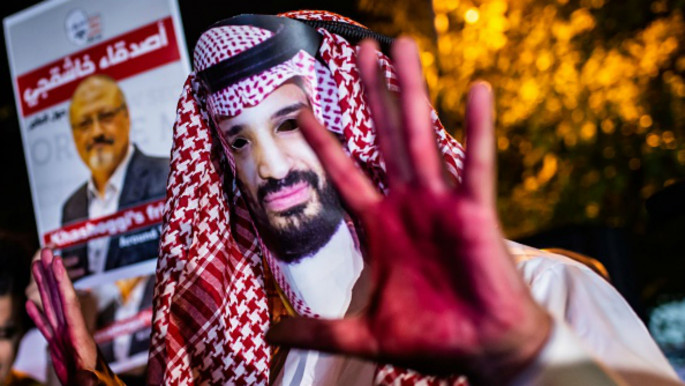Saudi-Israeli relations: The emergence of a new alliance
In 1947, Saudi Arabia was one of the first countries to oppose the formation of the state of Israel, voting against the UN Partition Plan. As the Custodian of the two holy Mosques, its rulers have always positioned themselves as the leaders of the Muslim world and the supporter of the Palestinian cause.
However, under the surface and despite both countries' efforts to keep their relationship as covert as possible, there are well documented reports indicating extensive behind-the-scenes diplomatic and intelligence cooperation between the two countries, in quest of mutual goals.
This was obvious in the interview Crown Prince Mohammed bin Salman (MbS) gave to The Atlantic Magazine in spring 2018 where he stated: "There are a lot of interests we share with Israel and if there is peace, there would be a lot of interest between Israel and the GCC".
Back in February 2019, during the Warsaw Mideast Summit, Netanyahu's office leaked a video of a closed session in which the foreign ministers of Saudi Arabia, Bahrain and United Arab Emirates can be seen defending Israel's right to exist and defend itself, and in one case saying that confronting Iran is more pressing than solving the Israeli-Palestinian conflict.
 |
|
| Read also: Netanyahu says Israel 'no longer the enemy' for Gulf states |
Their unprecedented comments showcased the remarkable evolving of the Israeli-Gulf relationship. So no wonder Netanyahu praised the summit, organised by the Trump administration in the Polish capital, as a "historical turning point" in the region's history.
The first signs of Saudi-Israeli rapprochement can be detected back in 2006 during the 34-day conflict between Israel and Hizballah – a war that could be seen as turning point in the regional dynamics.
The Saudi authority described Hizballah's action towards Israel as "illegitimate resistance involved in miscalculated adventure" that lead to the loss of lives in both Lebanon and Israel.
Two months later, then Israel's Prime Minister, Ehud Olmert, travelled to Jordan to meet up with Prince Bandar Bin Sultan. According to leaked reports, the two allegedly met to discuss the Saudi Arab Peace Initiative.
The former Mossad Chief Meir Dagan was in charge of building a strategic alliance with Arab partners for the purpose of intelligence sharing on Iran and how to prevent its further penetration in the region.
 |
There are a lot of interests we share with Israel and if there is peace, there would be a lot of interest between Israel and the GCC - Saudi Crown Prince MbS |
 |
A meeting was to take place in the resort of Aaqba in Jordan between Dagan, Prince Bandar and the head of the Jordanian Intelligence Service to discuss the very building of that alliance.
Although Saudi Arabia and Israel have no official diplomatic ties, they both share an obsessed determination when it comes to Iran.
According to Professor Yossi Mekelberg, this much perceived threat from Iran is the utmost important driver of Saudi-Israeli ties. In an interview with Alaraby Television, Professor Mekelberg said, "Let's not delude ourselves, Israel-Palestine is not the big issue right now, Iran is the big issue, and it's becoming bigger and bigger by the second... The Palestinians need to recognise that in order of priorities, they are not the top priority in the Gulf.
"There are domestic and economic issues that need to be addressed and, of course, Iran. And in this sense they, the Saudis, found in Israel an important ally."
The diplomatic and intelligence cooperation between Israel and Saudi Arabia was to further expand under Barack Obama's US presidency in 2008. They both shared a mutual animosity of Obama's administration and both fiercely opposed the Iranian Nuclear Deal deeming it inadequate to contain Iran.
 |
The Palestinians need to recognise that in order of priorities, they are not the top priority in the Gulf |  |
Saudi Arabia had long ago recognised that Israel's technological prowess could make for a useful ally.
In 2012, the world would witness the worst hack ever seen. Hackers managed to breach the computer system of Aramco, the Saudi national oil and one of the world's largest oil companies. In matter of hours, 35,000 computers were partially wiped or totally destroyed and Israeli businesses were called in to help unlock the jam.
Through offshore or front companies in Europe, USA and South Africa, Israeli business are operating in Saudi Arabia, on desalination, infrastructure protection, cybersecurity, and intelligence surveillance.
Though, caution is thoroughly employed when it comes to weapons sales. At the New Hampshire plant of Elbit System of America, a subsidiary of Elbit Systems, Israel's largest private defence contractor has been involved in covert sales deals with Saudi Arabia, without anyone noticing.
In January 2015, a mysterious incident occurred – a missile system technician, going by the name Christopher Cramer, was sent to help the Saudi army with a series of live-fire demonstrations and the sale of a TOW, an American anti-tank missile.
Carmer worked for Kollsman Inc, a subcontractor of Israel-based defence electronics company Elbit Systems. The reason this case came to some media attention was because Cramer was found dead in Saudi Arabia, with the Saudi authority claiming that he had committed suicide by jumping off the third floor of his hotel room in the city of Tabuk.
The developing ties between the two countries were given another major boost with Trump's arrival to the White House.
 |
|
| Read also: Mohammed bin Salman's waning influence |
Access to the White House means greater potential of influence and both the Saudis and the Israelis enjoy a privileged access in Washington.
This was further bolstered with the rise of MbS, who has a close relationship with President Trump and the latter's son-in-law and senior adviser, Jared Kushner.
Netanyahu happens to be an old family friend of the Kushners and there has been some speculation that Jared Kushner and MbS were introduced through Netanyahu.
The UAE, Bahrain and Oman have gone more public with their relations with Israel, while the Saudis have been more cautious. However, in 2018, the Saudi authority started to allow Air India to use its airspace for flights between India and Israel. Soon after, MbS explicitly recognised the right of the Jewish People to have their own nation-state.
 |
In 2018, the Saudi authority started to allow Air India to use its airspace for flights between India and Israel. Soon after, MbS explicitly recognised the right of the Jewish People to have their own nation-state |  |
In May 2019, the crown prince approved a plan that would allow Israeli Arabs to work and live in Saudi Arabia. In addition to this, the authority is now distributing special entry permits to employees of Israeli businesses, allowing them to enter the kingdom without showing a passport.
There is no available foreign trade data on any direct trade between Israel and Saudi Arabia or any Gulf state, but according to a report released in 2018 by the Tony Blair Institute for Global Change, it has estimated to be worth $1 billion a year. Other studies claim the amount is much higher as most Israeli connected businesses operate via companies registered in the EU, US or South Africa.
Most definitely the relationship between Israel and the Gulf monarchies have evolved significantly. But according to Professor Mekelberg the relations will continue to be limited as long as no significant concessions are made to the Palestinians.
"I think the Israeli leadership is deluding itself if they think that Saudi Arabia or anyone in the Gulf will start full diplomatic relationships or full normalisation without resolving the Israeli-Palestinian conflict in a just and fair way... It's an illusion," adds Professor Mekelberg.
Essentially, Saudi Arabia and its regional allies will continue to pursue their own interests with Israel while giving a lip service to the Palestinians.
In light of the recent confrontations and tensions at the Strait of Hormuz, the Saudis and their allies will continue seeking even more advanced military and intelligence sharing with Israel, while the latter will do its best in exploiting on this opportunity to further its agenda in the Gulf region.
In the world of politics all developments are possible, but who thought that this scenario would happen: the Israeli national anthem will be played for the first time in the UAE.
In the words of Israel's Cultural and Sports Minister Miri Regev, who was in Abu Dhabi: "We made history, the people of Israel live!"
Suzan Quitaz is a researcher specialising in counter-terrorism and policing, politics and society in Israel, history of Zionism and anti-Semitism.



